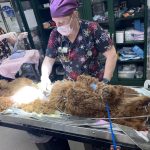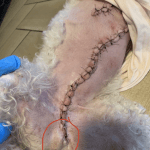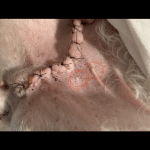Good morning. One of our shepherds used to get this way from time to time. It turns out that even though we are consistent, with him we had to be extremely diligent and consistent. Any change in routine would set him a little off. So for us it was a long road of patience and repetition. And walks. A LOT of walks. Going for a leashes walk where you are in charge is like a reset button in my humble opinion. It reminds them that you are higher in the pack order. The key is to catch the unwanted behavior right as or right before it starts-easier said than done. This helps you figure out the trigger and then in turn you can start to desensitize them to it. It is definitely a process of rewarding wanted behaviors and ignoring and redirecting where bad behaviors are concerned. Definitely a full time job, but it can be done. You may want to look into a certified dog behaviorist rather than a trainer. They can help you get started and would really be worth the money. Very best of luck.
My dog got spayed on August 1st, she is a 13 year old poodle mix. She also had a mastectomy along with her spay so she has a very big incision. She is on her 4th week and the lower half of her incision does not look like the top half. The surgeon said it may take a while to heal because of the placement but I noticed a bump at the base of her incision at day 4 that has not gone away. She keeps licking at it and the surgeon suggested we must let her heal and later investigate. Also, at day 10 I noticed a white tiny pimple sized thing trying to come through under her skin. I really checked it out today since it has not gone away and it feels like something sharp poking under her skin, she has two of these that feel the same. I am scared she might have torn her internal stitches but the surgeon did not seem too worried. I notice when she eats she seems to look like she feels uncomfortable. She threw up yesterday but I took it as maybe her pancreatitis acting up. I am freaking out and don’t know if I am making a big fuss over nothing. She did not run during her recovery but she would stand up on her hind legs no matter how much I attempted to keep her calm. She did slip 3 times and land on her tummy, twice at day 8 because I had her on a short leash and she would try to run, the third slip was at day 13 and for the same reason of the short leash and attempting to run. I feel so sad and don’t have peace of mind. I feel guilty she slipped on me those three times but then again don’t know what to make of that lump at day 4. After the two slips at day 8 and after on day 10 she started having severe diarrhea. I contacted the surgeons team and they suggested boiled chicken and boiled rice, but at day 12 the diarrhea was a soft serve ice cream consistency and then she thew up so I took her into emergency immediately. At emergency they checked her vitals and incision and could not figure out what may have caused the stomach upset since from her pancreatitis history did not have the swollen tummy and her incision looked fine. They attributed the upset to possible pain med side effect and prescribed a probiotic and to stop the gabapentin. It’s has been a tough healing process for her. I will attach pictures of of what the incision looked like at day 7, 10, and now. I hope it’s not what I am fearing but it’s better to know if I should advocate for her and have them check again. Thanks guys, sorry for the long story but this is my little girl who is my first owned dog and who has been by my side for 13 years. I love her so much and it pains me to see her uncomfortable. Fyi her appetite is always good no matter what and her bowels are back to normal since the 18th of august and they were fine before the 10th of august as well.
Comments
My 3 year old toy poodle, bailey, is currently having behaviour issues. He is well trained and we have even had a trainer not too long ago but despite all of this he is continuously going through phases a misbehaving/reactivity. These phases started to occurred since he was about 1. During a phase he typically gets very possessive aggressive, temperamental, reactive and starts to ignore all of his commands! Does anyone have any tips to help or stop these phases all together?
Comments
Could repeated flinching/seizure-like behavior be associated with eyesight?
Here is a compilation video: https://vimeo.com/434151259
Our 10-year-old toy poodle has begun flinching (for lack of a better word) repeatedly on walks. We’ve been to the vet, but due to an enlarged heart with a leaky valve he wants her to see her cardiologist to ensure it isn’t heart-related. We are trying to get an appointment but the pandemic is making wait times in the weeks and we’re concerned in the meantime about how dangerous waiting could be.
Based on our experience, the flinches rarely happen at home, happen much more frequently in bright sunlight on walks, especially facing the sun. They also occur much more frequently when leaving a shadow into the sun or leaving the sun into a shadow. Her vet has noticed early signs of cataracts and we’ve noticed her eyes getting cloudy. She’s also begun walking into things occasionally.
We’re hoping these are eye-sight related rather than seizures or neurological issues, but are unsure of next steps while waiting appointments with specialists.
Thanks.
Comments
I have a 4 year old poodle that I adopted after he became paralyzed from his back legs. He became paralyzed Dec 2018 and due to lack of resources, we chose the conservative method, but have seen minimal changes in the past 1.5 years since his injury. He is a very happy and friendly dog and doesn’t appear to miss his rear legs. My question is if he’ll ever feel his rear legs again? If his brain will ever detect them or know they are there? He has a wheelchair, but he dislikes it. His diagnosis is a slipped disk from two vets who also said he would be paralyzed for life. I took him to a trial treatment at Texas A&M Vet school, but unfortunately, the product they are developing is too far into the future. Looking for your opinion on what options, if any, my pet might have.
Thank you!
Comments
Good day folks, I have an urgent question here. My toy poodle who is just eight months old (female) just ate pieces of my mothers skincare facial masks! I’m urgently curious on whether or not my dog will be seriously harmed!
9 year bichon poodle who had low platelets in May 37.5. prednisone for 10 days platelets went up to 170. Off the medication for 2 weeks levels 143. We did not keep her on prednisone. Does homeopathic medicine affect platelets? Yesterdy blood test was at 90. Will she have to be on predinisone everyday for the rest of her life? She is acting normally other than that.
Hi, does anyone think they know what type of breed my dog is? He’s supposed to be a purebred miniature poodle but I don’t think he is. He has spots all around him, and his tail and size doesn’t look like a miniature poodle. Here’s the pic:
Comments
-
Anonymous did you buy him from a breeder? was he registered as a poodle?
i have difficulty with distinguishing the small fluffy companion breeds…i wish i could help ID the dog.
-
Angelina Wu Hi, thanks for replying! I did not buy him from a breeder, we bought him from a puppy store called Dreamy puppy. I don’t think he was registered as a poodle. A lot of people think he’s a bichon frise, I have a hard time telling the difference between the small fluffy breeds too 🙂 🙂 Thanks!!!!!
-
Anonymous Ah, that’s a shame…there really is no way to tell unless you want to spend money on one of those DNA tests.
-
Angelina Wu Thank you, just one more question- If you take him to the vet will the doctor be able to tell you or do you have to buy one of those DNA kit test things? Thank you ;>
-
Anonymous A vet MAY be able to tell when your puppy is older. Maybe.



















@kristamagnifico